英语词汇学6.3Synonymy
英语词汇学chapter6 Polysemy and Hyponymy
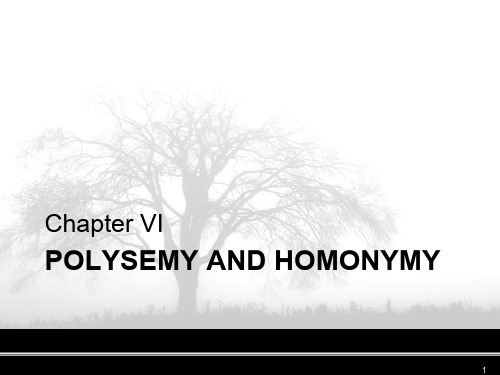
Two approaches
1) Diachronic approach(历时的) •From the diachronic point of view, polysemy is thought to be the result of growth and development of the semantic structure of a word.
2020/9/2
7
2) synchronic approach(共时的) •Synchronically, polysemy is thought as the coexistence of various meanings of the same word in a historical period of time.
– The basic meaning of a word is considered to be the core of word meaning, called the central meaning (中 心意义). The derived meanings, no matter how numerous, are secondary meanings (次要意义).
A piece of timber
board→木板→餐桌→会议桌→董事会
table
dining table
council table
13
• Concatenation describes a process where each of the later meaning is related only to the preceding one like chains.
3
Polysemy
词汇学 synonymy
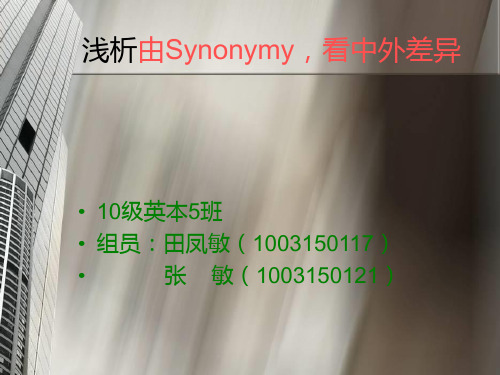
• 海洋文化_______________________ • 海洋文化海洋的广阔与一望无际而表现出大气与开放姿态(李白诗: “海水不满眼,观涛不称心。”);又因海洋无法私人占有而形成 平等观念,密切了人间关系(“同舟共济”“风雨同舟”)。 • 海洋是人类的精神家园,天风海涛,最能启迪人们想象与幻想;而 险恶的风波,又能培养人们的冒险精神,使航海成为勇敢者的事业。 海洋是流动的,变化的,宽容的,有较大自由度(普希金诗:“大 海,自由的元素。”),较少狭隘观念与保守思想。海洋又是积极 的,进取的,浪漫的,有广阔的想象与联想的空间,开拓人的心灵 世界。这些构成了海洋文化大气、强悍、机智、热情、浪漫、生气 勃勃、充满想象力与创造性的基本特征,也构建了海边民豪爽、旷 达、灵活、容易接受新事物与新观念的心理素质。海洋文化作为一 种商业文化,是一种城市文化、市民文化,体现了人类文化最新发 展成果,有鲜明的时代标志。其外延涵盖当代的科技发明、商业流 通与社会进步;其内涵包含近代的民主理念、平民意识与自由思想, 从根本上提高了人的文化素质与精神境界。 • 它不仅具有地域性与民族性,更具有时代性与世界性,标志当代先 进文化的前进方向。
• 据国外媒体报道,法国近日出台一项规定向加班叫 板:晚上6点后到早上9点之前的非正常工作时间内, 公司将不允许向员工发送邮件,也不可以给员工打 电话,在法国的外企也必须遵守这一规定。而且, 法国每周法定的工作时间仅为35个小时,此外员工 每年还必须配至少5个星期的带薪假期。
2#(2)爱国
林则徐历史事件:叙事为主 课后提问:1.日本人治台五十年给台湾带来的正、负面 影响为何?
5#:文化差异原因上升为哲学总结:价值观差异
6#:窥探漏洞、追主流(窥探国内差异中的非客
观因素,寻求发展)
词汇学
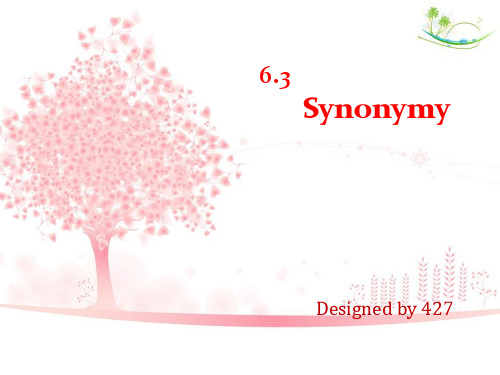
Relative synonyms,also called by some people near-synonyms,are similar or nearly the same in denotation,but embrace(包含) different shades of meaning or different degrees of a given quality.(相对同义词又叫近似同义词,指词的指示 意义基本相同或相似,但隐含意义或表达程度不同)
(词的比喻和委婉用法)
occupation(profession)
walk of life(fig)
4)Coincidence with idiomatic expressions
(单词与习惯表达在意义上的隔阂)
win
gain the upper hand
Within the native element,words are also found to express similar meanings such as fast--speedy--swift,handsome--pretty--lovely.
4.Discrimination
Generally speaking, there is no difference between absolute synonyms, but relative synonyms always differ in one way or another.
英语词汇学_Unit_06_Sense_relations

beautiful
expensive fast hot long rich wide
cheap slow cold short poor narrow
These pairs are called gradable antonyms because they do not represent a more/less relation. The words can be the end-points of a continuum (连续体). Since they are gradable, they allow comparison.
English ask time begin buy French question age commence purchase Latin interrogate epoch
Antonymy (反义关系)
Antonymy is a relationship of ‘meaning opposition’ that may hold between two words. Antonyms can be defined as words which are opposite in meaning. Major types of antonyms:
Gradable antonyms Contradictory or complementary antonyms Converse antonyms
Gradable antonyms
Gradable antonyms include pairs like the following:
ugly
Synonymy
自考英语词汇学 第六章课件
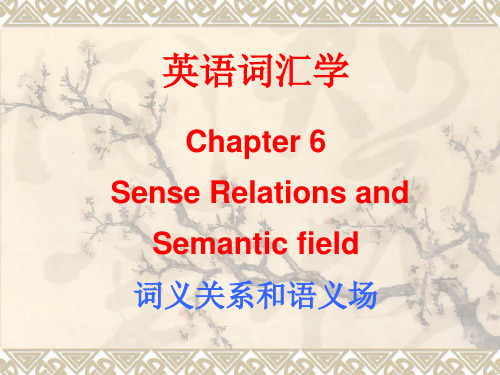
6.2 Homonymy 同形同音异义关系
Homonyms are generally defined as words different in meaning but either identical both in sound and spelling or identical only in sound or spelling. 同形同音异义词一般定义为在读音和 拼写上或者只是在读音或拼写上相同而词义不同的 词。 Based on the degree of similarity, homonyms fall into three classes: perfect homonyms, homographs and homophones. 根据相似的程度, 同形同音异义词又可分为 3 类:完全同形同音异义 词、同形异音异义词和同音异形异义词。
6.1.2 Two Processes of Development 多义词的两种发展过程
The
development of word-meaning from monosemy to polysemy follows two courses, traditionally known as radiation and concatenation. 词义从单义像多义发展遵循两种模式:辐射 型和连锁型。
6.1 Polysemy 多义关系
When
a word is first coined, it is always monosemic. 当一个词最初被创造出来的 时候,一律是单语义词。
6.1.1 Two Approaches to Polysemy 两种多义关系的研究方法
The
problem of interrelation of the various meanings of the same word can be dealt with from two different angles: diachronic approach and synchronic approach. 同一词的各种意义之间相互关联 的问题可以从历时方法和共时方法两个角度 来研究。
6英语词汇学第六章_同义反义上下义汇总

• • • •
代表整体的词:holonym 代表局部的词:meronym 属于局部的词: co-meronyms共局部词 e.g: book: holonym cover/page: co-meronyms 共局部词
•
Plant
• leaf, bud, stem, root, flower, shoot • • Petal stamen
semantic component.
( Jost Trier / German 1930’s)
• words of a semantic field are not synonyms but are joined together by some common semantic component
(between the genus(类概念) and the species(种概念).
Note:***---grammatical structure: • He likes dogs and other animals. • There is no flower more beautiful than a rose. • I like all fruits except bananas. • She reads books all day---mostly novels.
semantic field theory 语义场理论 • vocab. of a language is not just a listing of independent items, but organized into areas or fields, the members of which are joined together by some common
6.现代英语词汇学(第六章)

现代英语词汇学(第六章)
Semantic Classification of Words
Semantic classification of words means that vocabulary units are classified on the basis of various meaning relations between words on the paradigmatic axis (语义聚合轴线). Paradigmatic relation existing between words not only define the word meaning but also function as the main criteria underlying (accounting for) the semantic classification of words. For example, the criterion of common concept serves to classify words into semantic fields, whereas semantic relations of similarity, contrast and inclusion underlie ( are the basis of) respectively the classification of lexical items into synonyms, antonyms and hyponyms (下义词).
现代英语词汇学概论最强版复习资料chapter6
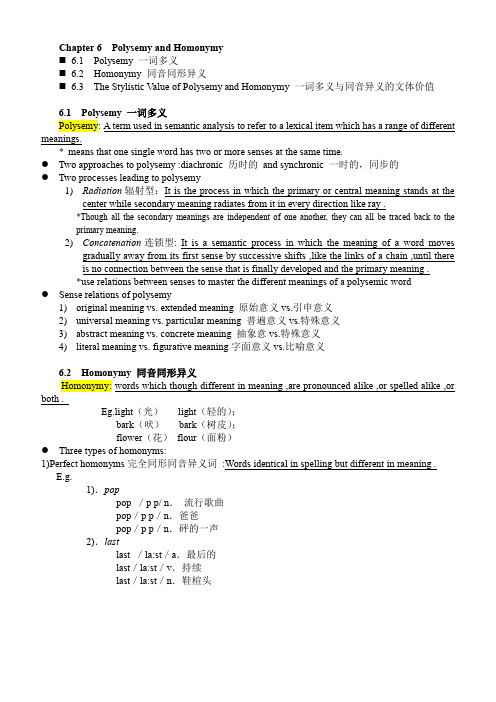
Chapter 6 Polysemy and Homonymy⏹6.1 Polysemy 一词多义⏹6.2 Homonymy 同音同形异义⏹6.3 The Stylistic Value of Polysemy and Homonymy 一词多义与同音异义的文体价值6.1 Polysemy 一词多义Polysemy: A term used in semantic analysis to refer to a lexical item which has a range of different meanings.*means that one single word has two or more senses at the same time.●Two approaches to polysemy :diachronic 历时的and synchronic 一时的,同步的●Two processes leading to polysemy1)Radiation辐射型:It is the process in which the primary or central meaning stands at thecenter while secondary meaning radiates from it in every direction like ray .*Though all the secondary meanings are independent of one another, they can all be traced back to the primary meaning.2)Concatenation连锁型: It is a semantic process in which the meaning of a word movesgradually away from its first sense by successive shifts ,like the links of a chain ,until thereis no connection between the sense that is finally developed and the primary meaning .*use relations between senses to master the different meanings of a polysemic word●Sense relations of polysemy1)original meaning vs. extended meaning 原始意义vs.引申意义2)universal meaning vs. particular meaning 普遍意义vs.特殊意义3)abstract meaning vs. concrete meaning 抽象意vs.特殊意义4)literal meaning vs. figurative meaning字面意义vs.比喻意义6.2 Homonymy 同音同形异义Homonymy: words which though different in meaning ,are pronounced alike ,or spelled alike ,or both .Eg.light(光)light(轻的);bark(吠)bark(树皮);flower(花)flour(面粉)●Three types of homonyms:1)Perfect homonyms完全同形同音异义词:Words identical in spelling but different in meaning .E.g.1).poppop /p p/ n.流行歌曲pop/p p/n.爸爸pop/p p/n.砰的一声2).lastlast /la:st/a.最后的last/la:st/v.持续last/la:st/n.鞋楦头现代英语词汇学概论最强版复习资料chapter62)Homophones同音异义词:Words identical in sound but different in spelling and meaning.Eg. air空气–heir继承人,后嗣bear忍受,熊–bare空的,赤裸的dear 亲爱的–deer鹿3)Homograph同形异音异义词:Words identical in spelling but different in sound and meaning .Eg. lead sow tear prayerSources of homonyms1.Phonetic convergenceUnder the influence of phonetic convergence ,two or more words whichonce were different in sound forms take on the same pronunciation thespoken language .E.g. melo –meal bean –been beat –beet flea –flee heal –heel2.Semantic divergenceWhen two or more meanings of the same word drift apart to such an extentthat there will be no obvious connection between them ,polysemy will giveplace to homonymy .E.g. flour –flower metal –mettle3.Foreign influenceE.g. host –one who entertains guest [L hospitis ]host –a large number ,an army [L hostis ,army ,hostile force ]4.ShorteningThis source is of decidedly subsidiary importance in formal writing but haswidespread influence in everyday speech.E.g. pop –popular (music )-to thrust ,to push (up ) 推6.3 The Stylistic Value of Polysemy and Homonymy一词多义与同音异义的文体价值Context plays a very important role in the hearer 's interpretation of words of two special types: different words of like form(homonymy)and words of several meanings (polysemy ).*Polysemic and homonymous words are stylistically useful to achievehumour or irony ,or to heighten dramatic effect .。
- 1、下载文档前请自行甄别文档内容的完整性,平台不提供额外的编辑、内容补充、找答案等附加服务。
- 2、"仅部分预览"的文档,不可在线预览部分如存在完整性等问题,可反馈申请退款(可完整预览的文档不适用该条件!)。
- 3、如文档侵犯您的权益,请联系客服反馈,我们会尽快为您处理(人工客服工作时间:9:00-18:30)。
expectation: either good or evil. anticipation: as a rule is a pleasurable expectation of something good. hope: is not only a belief but a desire that some event would happen.
7
Sense Relations between Words
-nyms Most wonderful of all are words, and how they …[relate] one with another.
O. Henry, as modified by a semantician
Words are related to one another in a variety of ways. These relationships have words to describe them that often end in the bound morpheme –nym It may be more accurate to think of the lexicon as network, rather than a listing of words as in a published dictionary.
to hope against hope, • to • lose • hope,• to pin one's hopes on sth.•
7.1.2 Patterns of synonymous sets in Modern English
Why so many synonyms? English is a language particularly rich in pairs of synonyms. The primary reason for this has to do with the history of language and especially with the wholesome borrowing from other languages. "The richness of • English • in synonyms is largely due to the happy mingling of Latin, French and Native elements". Generally speaking, the native words are the simplest and most ordinary and tends to belong to the ordinary colloquial language; The Greek or Latin borrowings are the most learned, most formal and most technical and they tend to be used in the most formal context; French borrowings stands between the native words and the Latin and Greek borrowings.
7.1 Synonymy
7.1.1 Definition of synonyms Gk synonymon --- “having the same name” syn--• together+• onuma,• a name . Traditionally: words differing in sound form but identical or • similar • in meaning. But: -- there are • more • polysemic • words • than • monosemic words, and it is inconceivable that a polysemic word could • have • the • same synonymous word for all its meanings. • e.g.•head: chief, boss, leader aptitude, talent He has a good head for history. mind, imagination to use one's head life It cost him his head. top headline, headgear front headlight, headwind
2) The triple scale pattern: Native French ask question fast firm fire flame fear terror goodness virtue holy scared rise mount time age
Latin interrogate secure conflagration trepidation probity consecrated ascend epoch
7.1.3 kinds of synonyms plete synonyms Complete synonyms or absolute or strict synonyms are very rare. Two words are totally synonyms only if they are fully identical• in • meaning • and interchangeable • in • any • context • without • the • slightest • alternation • • in connotative, affective and stylistic meanings. • e.g. fatherland—motherland word-formation--word-building breathed consonant--voiceless consonant scarlet fever – scarlatina caecitis – typhlitis (盲肠炎)
Latin amity aid interior exterior acute universe
In few cases, the native term is more literary than the foreign one: dale valley deed action foe enemy meed reward
(a) In degree of a given quality or in shade of meaning
(Synonyms with different connotation) e.g Small, tiny, diminutive, minute, microscopic, infinitesimal anger: the most general term rage: implies a loss of self control fury: The strongest word in the group, suggests a rage so violent that it may approach madness; indignation: denotes anger based on a moral condemnation of something • felt to be wrong and unfair. wrath: now limited in use to literature and figures of speech, • suggests a strong anger directed at some specific person or is uneconomical; it creates unnecessary redundancy in a language
2. Relative synonyms
Relative synonyms or loose synonyms or more accurately quasisynonymous • words, differ from complete synonyms in the following respects:
-- it seems impossible to speak of identity • or • similarity • of lexical meaning of a word as a • whole,• as • it • is • only • the • denotative meaning that may be said to be identical or similar. • Synonym: " • a word • having • the • same meaning as another word: as one of two or more words of the same language and grammatical category having the same essential or generic meaning • and differing only in connotation, application, or idiomatic use: • one • of • two or more words having essentially identical definition.• .• .• “ e.g.-- experiencing something experience interchangeable under certain conditions undergo
e.g. Tom is easily aroused to anger.
Mad with fury, John pounded his fist on the wall and beat his breast. Mary expressed her indignation at being unfairly dismissed. …the wrath of the gods refuse,• reject, • decline e.g. She decline the chair the judge pushed towards her. The employer refuse to "recognize" the unions. …those who accepted the offer and those who reject it.
